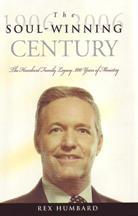Rex Humbard: The Soul-Winning Century
 Rex Humbard, The Soul-Winning Century, 1906-2006: The Humbard Family Legacy … One Hundred Years of Ministry (Dallas: Clarion Call Marketing, 2006), 252 pages, ISBN 9781595740557.
Rex Humbard, The Soul-Winning Century, 1906-2006: The Humbard Family Legacy … One Hundred Years of Ministry (Dallas: Clarion Call Marketing, 2006), 252 pages, ISBN 9781595740557.
Since almost the beginning of the twentieth century Pentecostal movement, members of the Humbard family have been engaging in earnest, energetic ministry to reach the lost for Christ. Rex Humbard, whose preaching has graced the airwaves for over 65 years, has now told his family’s story in his memoirs, The Soul-Winning Century.
While Rex Humbard became a household name through his groundbreaking television ministry, his father, Alpha E. Humbard also was an important pioneer preacher in his own right. Alpha Humbard, born in 1890 sixty miles north of Little Rock, Arkansas, had a rough childhood. Poverty, fights, liquor, and hard work dominated the world in which young Alpha was reared. However, he sensed God’s calling at a young age and overcame the odds to answer this call. Alpha was a practical, direct, no-nonsense kind of preacher whose compassion for people, according to this telling, overcame any deficit created by his lack of formal education. Perhaps it was this lack of haute couture—combined with a dependence upon God—that allowed him to touch the masses where they were at.
Alpha once recalled that a seminary-trained minister bitterly complained that, while he was a learned man with good diction and degrees, he could not draw the crowds like Alpha, whom he described as “an old farm boy, a clodhopper who can’t talk good English.” Alpha recalled that he recommended that the minister throw away his cigar, which he was smoking while complaining, and get on his knees and pray (p. 27). Alpha was not alone—his innovative, sometimes rough-and-tumble ways reflected a whole generation of early Pentecostal preachers.
Alpha strove to be a friend of all, but didn’t want to be tied too closely just to one group. He attended the organizational meeting of the Assemblies of God in 1914, but never joined that church. Alpha built up a thriving church, orphanage, and publishing house near Hot Springs. In addition, he issued credentials to more than 250 preachers. Alpha had laid the groundwork for a new denomination. By his son Rex’s estimation, however, the workload became too great. His credentialed ministers, who had rallied around themes of non-sectarianism, bickered over doctrinal details, which led to the dissolution of the group.
Curiously, The Soul-Winning Century contains very little detail about this important chapter in the Humbard family history—the rise and fall of an incipient denomination. (Alpha’s 1945 autobiography, From the Plow Handle to the Pulpit, contained little additional information.) The Flower Pentecostal Heritage Center (FPHC) recently acquired from Rev. Mahlon Midkiff a copy of the January 15, 1922 issue (volume 3, number 5) of Alpha’s Pentecostal newspaper, which sheds light on this segment of early Pentecostalism that eschewed organization. The paper was startlingly reminiscent of the paper that E. N. Bell edited prior to becoming the first Chairman of the General Council of the Assemblies of God. Like Bell’s paper, Alpha’s paper was called Word and Witness and was published in Arkansas (Bell’s paper was published in Malvern; Humbard’s was in Pangburn). Bell folded his paper into the Pentecostal Evangel, the official magazine for the newly-organized Assemblies of God, in 1916.
Category: Church History, Winter 2008


